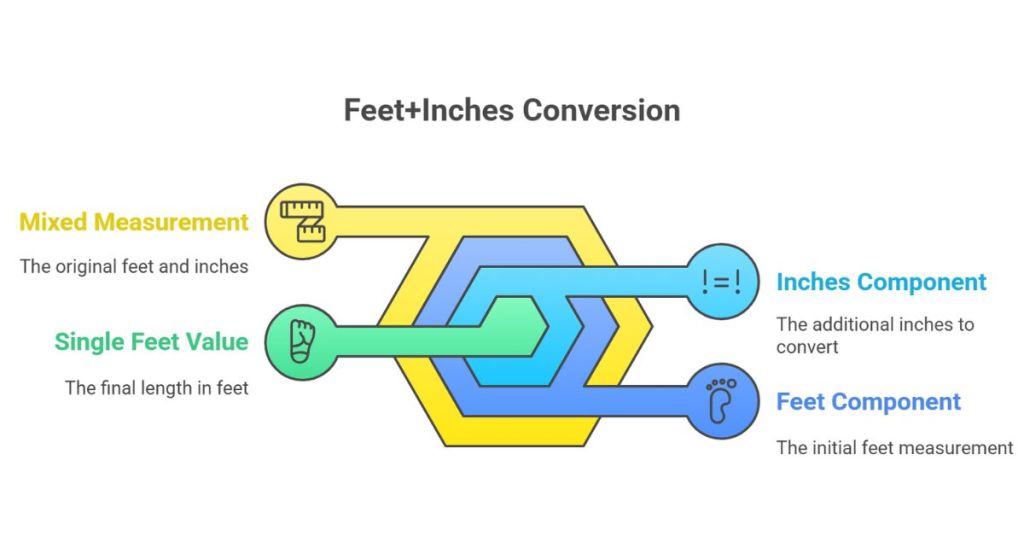Feet+inches to feet Calculator
Disclaimer: All calculators in the Textile Calculator have been reviewed by the relevant textile industry experts.
Formula for Feet + Inches to Feet
To convert a length measured in feet and inches to feet only, you can use the following simple formula:
Feet = Feet + (Inches ÷ 12)
This formula works because there are 12 inches in a foot. So when you divide the inches by 12, you convert them into feet and then add that to the existing feet measurement. For example, 5 feet 6 inches is equal to 5 + (6 ÷ 12) = 5.5 feet.
Table of Contents
In textile manufacturing, we work with different measurement units every day. One common conversion is from feet and inches to feet. This simple process helps in fabric layout, machine setup, and space planning on production floors. In this article, I will explain how this conversion works, how to use a calculator for it, and why it matters in the textile industry.
What Is Feet+Inches to Feet Conversion?
This conversion changes a mixed measurement (feet and inches) into a single value in feet. We often receive length data in both feet and inches. For example, a fabric roll may be 5 feet and 6 inches. Instead of working with both units, we convert them to feet only.

Why Is This Important in the Textile Industry?
Helps in Fabric Layout Planning
In garment factories, we plan fabric layout based on the table or cutting space. If the layout length is given in feet and inches, we must convert it to feet to match CAD or CAM machine requirements.
Useful for Machine Setup
Many machines in weaving and knitting units need measurements in a single unit. If we use feet-only data, the setup becomes easier and faster. This saves time during production shifts.
Essential for Buying Raw Materials
Suppliers may list fabric roll sizes in feet and inches. We convert them to feet to calculate how much fabric we need. This reduces wastage and improves cost accuracy.
How the Feet+Inches to Feet Calculator Works
Default Values Help Beginners
The calculator includes a default value of 5 feet and 6 inches. This shows how the system works even if users don’t input data. One click gives a quick result.
Simple Input and Output
Users type the feet and inches into separate boxes. After clicking “Calculate,” the result appears in decimal feet. A “Refresh” button clears the fields and resets the result.
Center-Aligned Design with Clear Buttons
The design is user-friendly and responsive. The main color is teal (#008080), which gives a modern look. Buttons are placed with space in between to avoid confusion.
Where to Use This Conversion
In Cutting Sections
Cutting workers often deal with measurements of fabric tables. If tables are 6 feet 3 inches long, converting that to 6.25 feet helps in pattern placement.
In Stitching and Quality Check
While stitching large garments like gowns or jackets, workers may check garment sizes in feet and inches. Converting helps maintain consistent quality.
In Store and Inventory
Textile stores track roll sizes in a single unit. Feet-only values reduce errors while recording or issuing fabric to production lines.
Benefits of Using the Calculator
Saves Time
Manual conversion takes time. The calculator gives quick and accurate results in one click.
Reduces Mistakes
By using a standard formula it removes guesswork. It ensures correct input for machines and layout systems.
Supports Training of New Workers
New staff may struggle with mixed measurements. This calculator helps them learn the process fast and avoid basic errors.
Best Practices in Using the Tool
Double Check Values Before Input
Make sure the feet and inches are written correctly. Wrong input will give wrong output.
Use the Result in Decimal Format
Always use the result as a decimal when feeding into layout software or machine settings.
Educate Workers
Explain how the formula works to the workers. This will help them understand the importance of accuracy in length measurements.
Final Thoughts
In textile and fashion manufacturing, simple tools make big changes. The feet+inches to feet calculator is one such helpful tool. It improves speed, accuracy, and workflow. With this calculator, even small tasks like converting fabric length become fast and error-free. As a textile engineer, I use this tool often in both the design and production sections. It helps maintain order and precision in our daily work.
